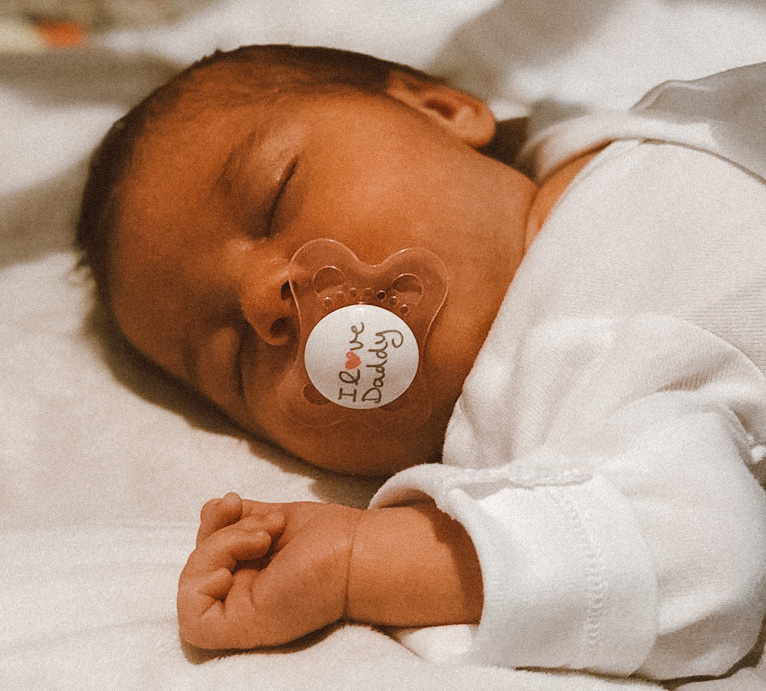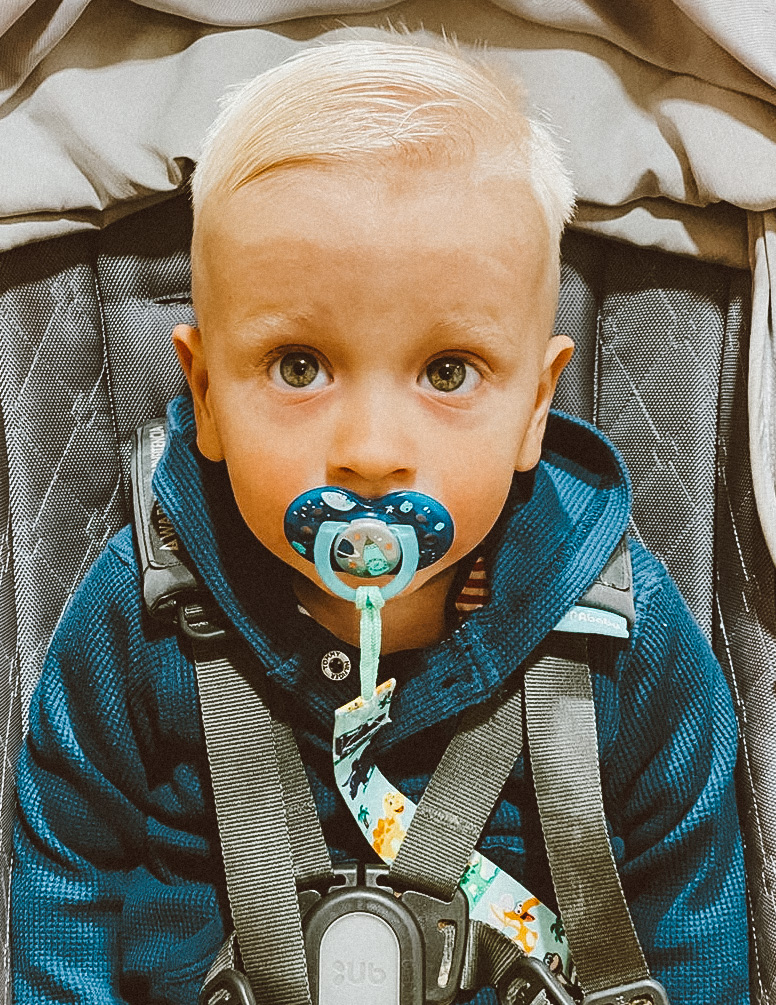Going Out to Dinner with Kids While on a Sleep Schedule
‘Can Babies Sleep with a Pacifier?’ & Other FAQ’s
Yes, babies can sleep with a pacifier – as long as they don’t have any external attachments, such as WubbaNub, or a pacifier clip. Pacifier attachments can pose safety risks during sleep. However, without such attachments, a pacifier can be especially helpful in the first couple months of a baby’s life. In fact, many newborns naturally prefer to suck to soothe, which is age-appropriate. In addition to being used for sleep, pacifiers can also be used to calm or soothe your baby, especially in the early weeks. A pacifier offers temporary distraction and more immediate soothing in times of discomfort. It can also be helpful when taking off or landing in an airplane or following immunizations, procedures, or blood tests.
Are Pacifiers Good for Babies?

While pacifiers offer comfort there are some other benefits, as well. The AAP recommends using a pacifier during the first six months of life as a protective measure against SIDS. To be clear, protective does not equate to preventative. Thus, it is crucial to understand that not using a pacifier does not increase the likelihood of a SIDS event. This can be confusing to parents, as undoubtedly, we all want to do is the best for our children.
At birth, babies’ lower jaws are naturally recessed due to the birthing process. Using a pacifier with a flat base can help bring the lower jaw forward, opening the airway. I always recommend reaching out to a lactation consultant before doing so, however, to avoid nipple confusion for nursing moms.
Also, using a cylindrical shaped pacifier, such as an Avent Soothie, can be helpful for suck training. With this pacifier, your baby can lift the sides of the tongue to wrap around the nipple, just as he or she does when nursing.
Can Pacifiers affect sleep?
Pacifiers keep babies in a lighter stage of sleep. Thus, pacifier usage for prolonged periods of time in older babies can impact your child’s quality of sleep, causing night wakings and early morning wakings. A child sleeping with a pacifier achieves fewer hours of the deepest levels of the most restorative REM sleep when compared to those who are pacifier-free. If your child is having trouble consolidating sleeping hours overnight after the newborn phase, it may be caused by pacifier use.
Until a child learns to re-insert pacifiers independently as older infants, the “Paci Pong Game” can exhaust an entire family. Especially after the change in sleep that occurs around four months of age, some parents will be woken after nearly every one of their little one’s sleep cycles solely to reinsert a pacifier. This, of course, negatively impacts sleep for the whole household.
In general, it is fair to say we see more sleep disturbances in infants and toddlers using pacifiers. That is – at least in part – due to the fact that pacifiers are famous for drowsiness. When a child uses a pacifier during awake times, it often falsely restores sleep pressure. This can result in short naps, early morning wakings, and overnight wakings. While these sleep issues are very common, they tend to be more prevalent with the reliance on a sleep prop like a pacifier.
How Does a Pacifier Impact Sleep Training?
Sleep props are, by definition, any external aide a child requires to fall asleep or stay asleep. Therefore, if offered to your baby or toddler at nap time and bedtime, pacifiers are sleep props. While we all may know some little ones that have slept well with a pacifier, we also know many who struggle significantly with sleep – due to the use of any sleep prop.
All humans cycle into lighter stages of sleep about three to five times throughout the night. That means, when a baby requires a pacifier to fall asleep, he or she will wake up looking for the pacifier to be replaced through these sleep cycle transitions. What parents experiencing night wakings desire is their child’s ability to rise to the surface of sleep, reposition, get comfortable again, and confidently go right back to sleep on their own without requiring intervention. This helps our little ones get the best sleep possible. Ideally, our team typically recommends embracing prop-free sleep by 12 weeks of age to enjoy the long-term benefits of healthy sleep habits. This ensures little ones truly learn the skill of independent sleep, long before the changes associated with the four-month sleep regression (which is not inevitable!) occur.
The long-term use of a pacifier can impact a child’s ability to soothe himself through various experiences during the day. If a baby is accustomed to always using a pacifier to soothe through boredom, teething, etc., overall fussiness can increase. Regulating emotions independently is a great skill for little ones to practice as they grow, and will assist with sleep training.
Are Pacifiers Bad for Mouth Development?
Yes. On-going use of pacifiers can have consequences on other aspect of a child’s mouth development and breathing, such as:

- Breathing Disorders: A pacifier can act like a splint, keeping an airway open for nasal breathing. Unfortunately, this can mask red flags for sleep-disordered breathing. In my line of work, I prefer to teach little ones to maintain open airways without something in their mouths. If a parent has concerns about a child’s risks for obstructive sleep-disordered breathing, I recommend seeking an evaluation. In such cases, input from a feeding therapist or SLP who focuses in airway health is helpful.
- Tongue position: The most natural resting position for the tongue is sealed to the roof of the mouth. Using a pacifier prevents that position, which over time, can lead to mouth breathing. This occurs when the muscles in the lips aren’t built adequately enough to keep the lips sealed at rest. Mouth breathing often contributes to narrow palates, teeth crowding, and other potential dental or health risks down the road.
- Tongue Thrust: Depending on the frequency and duration of the pacifier use, your baby can develop a tongue thrust. This is a concern because thrusts can cause a dysfunctional swallowing pattern and a host of dental issues. Unfortunately, there are other complications that can arise as well, including middle ear drainage issues, low tongue posture, chronic nasal congestion, and enlarged tonsils/adenoids.
- Language Development: Toddlers that use pacifiers for daily awake times can impact language development. Young children are less likely to explore different sounds with a pacifier in their mouths while they are awake. At times, delayed speech is a consequence of continuous pacifier usage.
If, When, & How Long
After reading through our pacifier FAQ’s, each family can determine if, when, and how long to use a pacifier. As your baby grows their needs change. If the pacifier was useful in the newborn stage but no longer suits your life now, don’t be afraid to make a change. If you need assistance with removing the pacifier from your child’s sleep, we can help you embrace changes without looking back!

Melina Moses is a Senior Pediatric & Adult Sleep Consultant with experience in orofacial development, specifically as relates to sleep. As a mother of four (all born with tongue ties!), Melina is passionate about educating and helping those with sleep apnea and upper resistance airway syndromes find the path to more restorative sleep.


